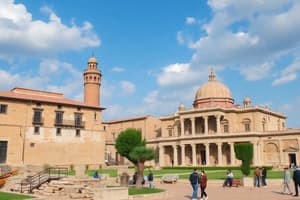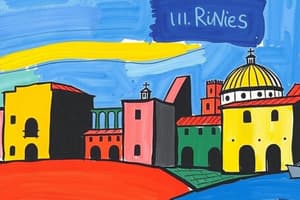Podcast
Questions and Answers
What is the primary difference between primary and secondary sources?
What is the primary difference between primary and secondary sources?
- Primary sources are narratives while secondary sources are facts.
- Primary sources are created after an event, while secondary sources are created during the event.
- Primary sources are original documents, whereas secondary sources analyze those documents. (correct)
- Primary sources are used for fiction, while secondary sources are for nonfiction.
Which historical period is characterized by feudalism and the rise of Christianity?
Which historical period is characterized by feudalism and the rise of Christianity?
- Classical Antiquity
- Ancient History
- Middle Ages (correct)
- Renaissance
Which major historical figure is known for leading the Indian independence movement?
Which major historical figure is known for leading the Indian independence movement?
- Mahatma Gandhi (correct)
- Galileo Galilei
- Julius Caesar
- Alexander the Great
What significant change occurred during the Renaissance period?
What significant change occurred during the Renaissance period?
Which event marked the transition from ancient to medieval Europe?
Which event marked the transition from ancient to medieval Europe?
What critical factor do historians analyze to understand historical events?
What critical factor do historians analyze to understand historical events?
Which of the following events significantly reshaped international relations in the 20th century?
Which of the following events significantly reshaped international relations in the 20th century?
What is historiography concerned with?
What is historiography concerned with?
Flashcards are hidden until you start studying
Study Notes
Key Concepts in History
-
Definition of History: The study of past events, particularly in human affairs, often emphasizing their causes, contexts, and implications.
-
Historiography: The study of how history is written and the various interpretations of historical events.
-
Primary vs. Secondary Sources:
- Primary Sources: Original documents or evidence from the time period being studied (e.g., letters, photographs, artifacts).
- Secondary Sources: Analyses or interpretations of primary sources (e.g., books, articles).
Major Historical Periods
-
Prehistoric Era:
- Time before written records.
- Key developments: Stone Age, Bronze Age, and Iron Age.
-
Ancient History:
- Birth of civilizations (e.g., Mesopotamia, Egypt, Indus Valley).
- Development of writing, agriculture, and trade.
-
Classical Antiquity:
- Rise of empires (e.g., Roman Empire, Persian Empire).
- Philosophical advancements (e.g., Socrates, Plato).
-
Middle Ages:
- Feudalism, the rise of Christianity and Islam, the Byzantine Empire.
- Effects of the Black Death and the Crusades.
-
Renaissance:
- Rebirth of art, culture, and science in Europe.
- Key figures: Leonardo da Vinci, Michelangelo, Galileo.
-
Early Modern Period:
- Age of Exploration, colonialism, and the Protestant Reformation.
- Advancements in science and philosophy (e.g., Enlightenment thinkers).
-
Modern History:
- Industrial Revolution, world wars, and globalization.
- Technological innovations and social movements.
Important Historical Concepts
- Cause and Effect: Understanding how historical events influence one another.
- Change and Continuity: Analyzing what changes over time and what remains constant.
- Perspective: Recognizing the importance of viewpoint in historical interpretation.
Notable Historical Figures
- Alexander the Great: Conqueror who created one of the largest empires in history.
- Julius Caesar: Roman general and statesman pivotal in the rise of the Roman Empire.
- Mahatma Gandhi: Leader of the Indian independence movement against British rule.
Major Historical Events
- The Fall of the Roman Empire: Transition from ancient to medieval Europe.
- American Revolution: Movement for independence from British rule.
- World War I and II: Global conflicts that reshaped international relations.
Research and Study Tips
- Utilize a mix of primary and secondary sources for comprehensive understanding.
- Create timelines to visualize chronological relationships between events.
- Engage with multiple perspectives to enrich interpretation of historical narratives.
Key Concepts in History
- History encompasses past events in human affairs, focusing on their causes and implications.
- Historiography examines how history is recorded and interpreted through different lenses.
- Primary Sources: Authentic materials from the period (e.g., letters, artifacts), essential for original insights.
- Secondary Sources: Interpretations of primary sources (e.g., historical analyses), providing context and understanding.
Major Historical Periods
- Prehistoric Era: Time before written records, marked by the Stone Age, Bronze Age, and Iron Age.
- Ancient History: Emergence of civilizations like Mesopotamia and Egypt, leading to innovations in writing and agriculture.
- Classical Antiquity: Development of powerful empires such as Rome and Persia, alongside significant philosophical advancements by thinkers like Socrates and Plato.
- Middle Ages: Characterized by feudalism, rise of major religions (Christianity and Islam), and notable events like the Black Death and Crusades.
- Renaissance: Cultural rebirth in Europe highlighting art and science, with significant figures including Leonardo da Vinci and Michelangelo.
- Early Modern Period: Marked by exploration, colonialism, and transformations in thought during the Enlightenment.
- Modern History: Defined by the Industrial Revolution, global conflicts (World Wars), and the impacts of globalization.
Important Historical Concepts
- Cause and Effect: Examines interrelations between historical events and their outcomes.
- Change and Continuity: Focuses on what evolves and what remains stable over time.
- Perspective: Highlights how viewpoint influences the understanding of historical narratives.
Notable Historical Figures
- Alexander the Great: Renowned for creating a vast empire and spreading Greek culture.
- Julius Caesar: Influential in expanding the Roman Empire and central to its political transformation.
- Mahatma Gandhi: Instrumental in leading India's non-violent struggle for independence from British colonial rule.
Major Historical Events
- The Fall of the Roman Empire: A significant transition that led to the emergence of medieval Europe.
- American Revolution: A pivotal movement seeking independence from British governance, shaping democratic ideals.
- World War I and II: Two major global conflicts that profoundly altered political boundaries and international relations.
Research and Study Tips
- Blend primary and secondary sources for a well-rounded understanding of historical contexts.
- Construct timelines to depict the chronological order of events and their interconnections.
- Explore various perspectives to deepen comprehension of history's complexity and narratives.
Studying That Suits You
Use AI to generate personalized quizzes and flashcards to suit your learning preferences.




